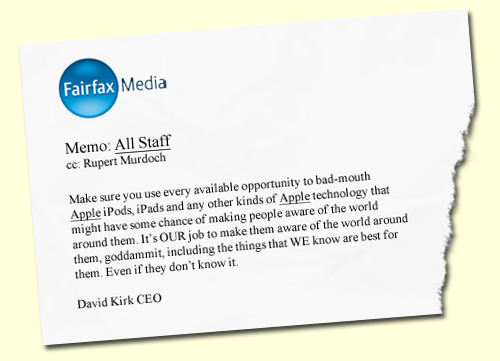Thu 25 Nov 2010
No Sound in a Vacuum?
Posted by anaglyph under Competition!, Daft Advertising, Words
[66] Comments

This vintage Christmas poster from Shockblast comes with its own thought balloon. Acowlytes! It was made for us!

Thu 25 Nov 2010
Posted by anaglyph under Competition!, Daft Advertising, Words
[66] Comments

This vintage Christmas poster from Shockblast comes with its own thought balloon. Acowlytes! It was made for us!

Tue 23 Nov 2010
Posted by anaglyph under Science, Technology, Words
[10] Comments

Ah, reminds me of the good ol’ days.
___________________________________________________________________________
Snaffled from the Fourmilab libraries, with thanks and apologies for copyright infringements if any.
___________________________________________________________________________
Thu 21 Oct 2010
Posted by anaglyph under Gadgets, Hmmm..., In The News, Skeptical Thinking, Technology, Words
[7] Comments

A few days ago in my post iPods Will Kill You! a couple of commenters thought I might be over-analyzing the current trend for the Fairfax media (among others) to be engaging in Apple-bashing. Naturally enough, my antennae have been quivering ever since, on the lookout for some further substantiation of my claim. Indeed, the ink was hardly dry on that post before Universal Head pointed out another instance in the Sydney Morning Herald the very next day.
And this morning, this, under the headline ‘Smart phone, pity criminals are proving even smarter’:
The story goes on to detail how the head of the ACC, John Lawler, ‘said’ at an Australian Institute of Criminology conference, that Apple’s iPhone was a veritable treasure trove of criminal opportunity.
Only thing is, if you read the article carefully, Mr Lawler is never quoted once as having said anything of the sort. He never specifically names the iPhone in any of his attributed quotes. He certainly mentions ‘personal communication devices’ and ‘instant services’ but these are catchall phrases that cover a lot of ground
Now, I’m not saying that Mr Lawler didn’t actually mention the iPhone during his presentation, but there is no evidence of that in this article. The thing is, the piece is written in such a way that a casual reader could easily come away with the impression that he did.
Applying a little critical thinking to this story reveals it to be a wonderland of misdirection. Let me guide you through:
The global obsession with the iPhone…
The ‘obsession’ with the iPhone is no more an obsession than is the desire to own any other popular product. This so-called obsession is an invention of the media. People like their iPhones because they are useful and appealing. Why is that obsessive? Popularity doesn’t equal obsession, it just equals popularity. If anyone is obsessed with the iPhone, it’s the newspapers. They’re the ones obsessively telling us at every opportunity about how we’re obsessed with the iPhone.
This year Apple’s chief financial officer told a shareholder meeting that more than 70 Fortune 100 companies were either using or trying out iPhones, and it was rapidly replacing the BlackBerry as the must-have business phone.
This sentence follows quickly on the heels of Mr Lawler’s quote, deftly conflating the two paragraphs to give the inference that this was also said by him. The intention is obviously to imply to the reader that he also went on to say, in the next paragraph:
But unlike the BlackBerry and other smartphones, the iPhone does not allow a company’s IT staff to install and upgrade its own security software, leaving business networks at risk of penetration.
Whether nor not these are Mr Lawler’s thoughts (and this is far from clear), a discerning person can only respond SO WHAT? The banality of this statement is profound on so many levels. How many people with BlackBerries have security software installed by their IT department? I’d wager next to none. And, even if they do, what the heck does that entail? Some password protection? You can do that on the iPhone. Encrypted files? You can do that on the iPhone. A kill switch? The iPhone has that. What we’re supposed to believe here is that IT departments are the be-all and end-all of security – a myth kept in circulation largely by IT departments. The ultimate security on any system has to do with user responsibility. If the IT departments of corporations are really concerned about security they would do well to spend less time trying to solve problems with tech fixes and instead devote some serious energy to teaching their users some basic computer hygiene. My iPhone is secure. You can’t get my data if you find and steal my phone. And if you did steal it, I would remotely kill it (if you hadn’t already done it yourself by attempting to circumvent the security). Does the ACC think this is impossible on a iPhone? I don’t believe they’re that naive.
And anyway, let’s say the contention is true. Do we really want to compare it to the security of the open-system Android, or the plethora of Nokias, Samsungs and Sonys out there? Or perhaps the new Windows 7 phone? (Windows – now there’s a secure and virus-free environment!) The fact is that, as popular as the iPhone is, it is still well and truly outnumbered by other brands. This being the case, rather than be concerned with the security-catastrophe-that-is to-come when iPhones rule the planet, why is this story not about the security disaster that is already in place?
Mr Lawler also said the increasing ubiquity of the phone meant that criminals were finding more and more opportunities to use it to intrude, to steal and to defraud.
Well, DUH. I can’t even comment on this, except to say that once again this is not a direct quote from John Lawler. Why is the reporter giving us Mr Lawler’s non-specific-brand terms like ‘communications devices’ in direct first-person quotes and yet attributing anything about the iPhone at second hand? I’ll tell you exactly why – because if Mr Lawler didn’t single out the iPhone by name in his talk, it’s very easy for the reporter to say he intended ‘the phone’ in a much more general sense (as in ‘the mobile phone’). With that in mind, read that paragraph again and you’ll see what I mean. The English language is a sublimely slippery substance.
In fact, the next direct quote from John Lawler again mentions only ubiquitous technology:
”With the explosive uptake of personal communication devices there are certainly already opportunities that appeal to organised criminals,” said Mr Lawler.
That’s a sensible, if very general observation. Organised criminals use mobile phones! So do librarians.
Even the desire for the phone is creating a burgeoning black market, he said.
Yes, as has the desire for PS3s, Gucci handbags and cigarettes. Black markets spring up anywhere and everywhere that there is an item of value that can be produced without imprimatur and sold for less than a legitimate vendor’s prices. This is perhaps a point of interest, but hardly the stuff of news.
The most disturbing thing about this whole pile of non-news is that in the course of less than one day it’s been disseminated so widely that trying to search for any actual information about what John Lawler might really have said at the Institute of Criminology conference turns up only myriads of requoted versions of the Fairfax article. Pretty much all of them bandying around headlines like ‘iPhone Poses Threat to Security!’ Hundreds of dumb zines and tech blogs have just taken the Fairfax article completely at face value without an ounce of critical appraisal. Most of them quote the article word for word. Some of them get opinions from their own ‘experts’ expounding the crumminess of the iPhone’s security. Many of them plainly have vested interests or agendas. ((If you have time, go read some of the ones linked in the Google search. It is an astounding (and depressing) eye-opening example of uncritical re-mouthing of something that has low information and high titillation value.)) If this is not about trying to denigrate Apple products, then it has that sum effect anyway. Everyone who uncritically picked up this story did so because it felt good to put the boot in.
I would sincerely like to know what John Lawler said at that conference. Did he single out iPhones as promoting such a large and serious security problem? If so, what were his reasons, given that iPhones are no less secure than many other devices on the market? ((I’m not claiming that iPhones are the Fort Knox of mobile phones, by the way – just that as security risks go – as devices – they’re neither here nor there. They could be better, sure, but they are decent enough if you take the trouble to use their security features properly.)) Or did he, as I suspect, merely mention the iPhone as one of a growing number of mobile personal communication and computation devices that should take security more seriously?
I will continue to investigate this as I am able, but if anyone was at that conference, or has any more information, I’d love to hear from you.
Mon 18 Oct 2010
Posted by anaglyph under Facebook, Peter Popoff, Safety Craig, Sister Veronica, Words
[8] Comments
Sun 17 Oct 2010
Posted by anaglyph under Gadgets, Idiots, In The News, Rant, Skeptical Thinking, Technology, Words
[34] Comments

That example par excellence of stellar journalistic accomplishment The Melbourne Age, tells us this morning that iPods and iPads are nothing less than the Typhoid Mary of the looming global apocalyptic pandemic. Well, they stop just short of putting it exactly like that, but it is hard to understand why they’re running an article headlined ‘Apple Store Teeming With Germs’, if not to warn good citizens about the looming plague.
Because they surely wouldn’t be doing it just to bash Apple…
The story, if you haven’t guessed, is that demonstration models of the abovementioned devices on display in Apple stores, can transfer germs from one prospective customer to another – a concept that seems to send the journalist responsible for this rubbish (one Asher Moses) ((Well, I guess he’s not entirely responsible. Like pretty much all modern journalism it’s just a story recycled from somewhere else – in this case, The New York Daily News.)) into virtual paroxysms of hand-wringing. The article give us all kinds of ominous facts and figures, with commentary by various and sundry ‘experts’, about how iGadgets in Apple stores (mentioned solely and specifically) are contaminated with various kinds of icky bacteria. It’s all so very ewwwwww. ((It’s hardly surprising that the bacteria mentioned are in evidence – they are among the most common on the planet.))
In a further attempt to give the story credence, Mr Moses happily goes on to conflate a completely separate dataset with his speculation. He breathlessly inform us that Britain’s Which? magazine, in consultation with a ‘hygiene’ expert, examined a sample of 30 (unnamed brand) mobile phones and found that:
…the average handset carries 18 times more potentially harmful germs than a flush handle in a men’s toilet.
O.M.G!
Aside from the fact that a study like that (even if it is executed properly) is completely irrelevant to this story, ((Consider this – the flush handle in a men’s toilet is probably cleaned at least once a day, if not more frequently. It is NOT a good benchmark against which to measure anything except other things that get cleaned as frequently. It’s irrelevant in respect to phones (inasmuch as you could choose ANYTHING which doesn’t get cleaned much with which to compare it – tv remotes, say, or car keys) and it’s certainly meaningless in terms of iPads in Apples stores unless you have some kind of tangible link. This is a journalist using data recklessly and indiscriminately to attempt to add weight to an article that is lighter than The Zero.)) please to note the journalistic weasel word ‘potentially’ in that quote. Let me give you a Tetherd Cow Ahead rephrasing of that:
•Experts find that stairs are potentially life threatening!
•Experts find that water is potentially lethal!
•Experts find that newspapers are potentially dangerous to your mental health! (Oh wait. That’s true no matter how you look at it).
This stupid piece of scare-mongering fluff is a shining example of why I will be happy to see newspapers go the way of the town crier, and hopefully, their owners and editors hauled off by tumbrel. Honestly – what is the point of such a story?
Let me ask you, Mr Moses, why isn’t this piece about the thousands of other things that are touched by human hands in the course of a normal day? Like escalator handrails? Or lift buttons? Or money? Or salt shakers in McDonalds? Or ATMs? Or public phones? Or demonstration products belonging to other electronics goods retailers????
Could it be, perhaps, that the mileage you would get out of that might not be so… convenient… to your purpose of trashing a successful company that makes products that promise to be the biggest threat to your livelihood since the advent of television?
